
A girl who only had one brother liked the place where she and her parents lived. There was a river nearby, where she could draw water, and the family’s cattle enjoyed the sweet grass which grew by the riverside. The huts were shaded from the hot sun by the broad leaves of the trees, and at night there was a soft breeze from the hills, which kept them cool. Passers-by, who called in to drink water from the family’s calabashes, would say how much they envied that quiet place, and how their own places were so much drier and dustier.
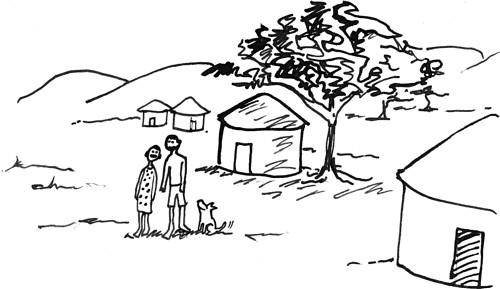
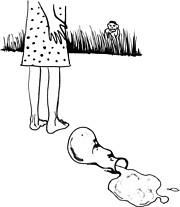
Then a terrible thing happened, which spoiled the happiness of the family. The girl had gone to fetch water from the river and was walking back to her hut with a large calabash on her head. Suddenly she began to feel that she was being followed. At first she did nothing, but then, when the feeling became quite strong, she turned round and looked behind her. There was nothing to be seen, although the tall grass moved and there was a faint sound, rather like that which a creature makes when it scurries through a bush.
The girl continued on her way. After she had taken a few more steps she again heard a noise. This time she swung round more sharply, dropping the calabash to the ground. There was a man behind her, crouching down, half in the grass, half out of it.
The girl was frightened by the sight of the man, but she tried not to show her fear. He smiled at her, and rose to his feet.
“You must not be afraid of me,” he said. “I am just walking in the grass.”
The girl could not understand why a man should wish to walk in the grass, but she did not say anything. The man came up to her and reached out to touch her.
“You are a nice, fat girl,” he said.
The girl was now very nervous and moved away from the man’s touch.
“My father’s place is just there,” she said. “I can see the smoke from his fire.”
The man looked in the direction of the huts.
“If that is so,” he said, “I can walk with you to your father’s place, where I can eat some food.”
The girl walked ahead of the man and soon they came to the circle of huts under the trees. There the stranger waited at the gate while the girl went in to tell her father that there was a man who wished to eat some food. The father came out, called to the man, and invited him to sit on a stone under one of the trees. Food was made by the girl’s mother and given to the man. He took it, and put it all into his mouth in one piece. Then he swallowed, and all the food was gone. The girl had not seen a man eat in this way before and wondered why he should be so hungry.
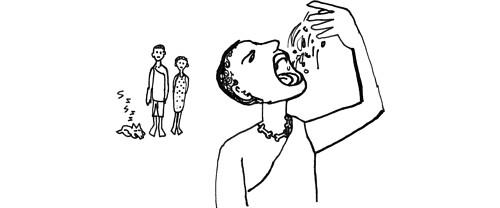
After the man had eaten, he got up and said goodbye to the father. He looked around him before he left, as if he was trying to remember what the family looked like and what they owned. Then he walked off and was soon obscured by the tall grass that grew in that part.
The girl went to stand by her father’s side.
“That was a very wicked man,” said the father. “I am very sorry that he visited this place.”
“I am sure he will not come back,” the girl said. “He was going somewhere else when I met him.”
The father shook his head sadly.
“Now that he is here,” he said. “We shall have to leave. I shall tell your brother to collect his sleeping mat and get ready for us to go to some other place.”

The girl could not believe that the family would be leaving the place where they had lived for so long and of which she felt so fond. She tried to persuade her father to stay, but he was convinced that they were in great danger by staying where they were.
“It is better to move now,” he said, “than to regret it later.”
The girl wept, but her tears were ignored by her father. Soon he had all the family’s possessions loaded on his back and was calling out to the others to follow him on the path.
“I shall not come with you,” the girl said defiantly. “I have been happy in this place and see no reason to move.”
The girl’s mother pleaded with her to go, but the girl refused. Eventually the father became impatient.
“If you must stay,” he said, “then you should at least go and live in a cave in the hillside. There is a place there where there is a large rock which can be used as a door. At night you must roll that rock in behind you and let nobody into the cave.”
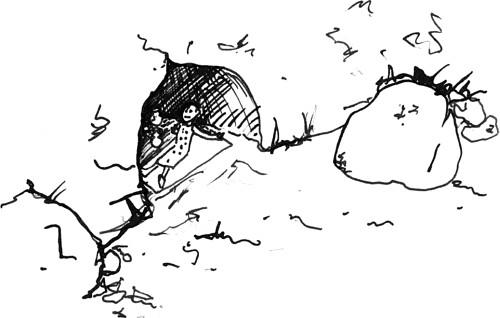
The girl agreed to this, as she knew that nearby cave. It was comfortable and cool, and she thought she would be happy there. As the rest of the family disappeared down the path that led to their new place, she took her mat and her pots to the cave and set them on a ledge at the back. Then, since it was beginning to get dark, she rolled the rock in the front into position. Inside the cave, it was pitch black, but the girl felt safe and she slept well that first night.
The next day, the girl’s brother paid her a visit to see how she was. She told him of how comfortable she had been in the cave and of how well she had slept.
“I am safe there,” she explained. “The rock blocks the mouth of the cave and I shall open it to nobody. If you come, though, you should sing this song and I shall know that it is you.”
The girl then sang a short song, which the boy listened to. He kept the words in his mind, as he planned to visit the girl that night to make sure that she was safe and that the rock was acting as a strong enough door.
That evening, when he returned, it was already dark. As he approached the cave, he sang the song which she had taught him:
There is a rock here and the cave is dark;
Open the cave, my sister, and let me in.
When the girl heard this song, she knew straight away that her brother was outside. She pushed at the rock and it rolled to one side. Her brother was pleased to see that the song worked and that his sister was safe. He gave her the food that he had brought her and then said goodbye.
“Make sure that you roll the rock back once I am outside,” he said.
“I shall always remember that,” his sister replied. “A girl could not live alone in a cave like this unless she had a rock for protection.”
The brother came the next day, and the day after that. On his third visit there was something that worried him. Not far from the cave he noticed that there were footprints on the ground and that lying nearby there was a bone which had been gnawed. He picked up the bone and looked at it. Whoever had eaten it must have had a great appetite, for his teeth had cut right into the bone to extract its goodness. The footprints were large, too, and the sight of them made the brother feel uneasy.
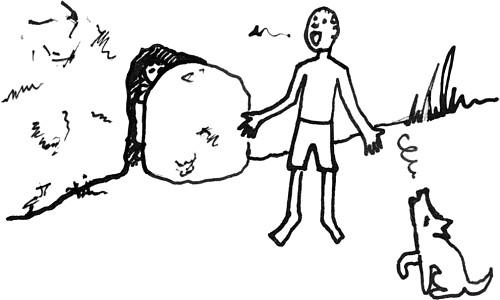

He arrived at the front of the cave and began to sing his song. As he did so, he had a strange feeling – as if there was somebody watching him. He turned round, but all that he saw was the wind moving through the dry brown grass and a rain bird circling in the sky. He finished the song, and the girl rolled back the rock to let him into the cave.
“I would like you to come and live with your family again,” he said to the girl. “We are sad that you are not with us.”
“I am sorry too,” she replied. “And yet I love this place too much to leave it. Perhaps one day my father will decide to come back here.”
The boy shook his head. He knew that his father would never come back now that he had found that he liked the other place to which he had gone. Soon the memory of this place would fade and the family would talk no more about it.

The boy ate some food with his sister and then left. As he walked away, he again felt that there was somebody watching him, but again he saw nothing but the wind and a small snake that moved like a dark arrow through the dry leaves on the ground.
The man who had driven the family away from that place was a cannibal. Now he had heard the boy singing his special song to his sister in the cave and he had remembered the words. Under a large tree not far away, he practiced the song which the boy sang. His voice, though, was too rough, and he realized that no girl would be fooled into believing that it was the voice of her young brother.
The cannibal had a way to deal with this. He made a fire, and on the fire he put a number of stones. Then, when these stones were red hot, he put them in his mouth and let them lie against that part of his throat that made the sound. After a few minutes he spat out the stones and tried the song again. The stones had done what he had hoped they would do and his voice was now as soft as the boy’s.
Inside the cave, the girl had settled herself to sleep on her sleeping mat when she heard her brother singing outside. It surprised her that he should come back so soon, but then she remembered that he had left a calabash in the cave and might be returning to collect it.

“I am coming, my brother,” the girl sang out. “The rock will move back and let you in.”

By the time that the mouth of the cave was half open, the girl realized that it was not her brother who was standing outside. When she saw the cannibal, her heart gave a leap of fear and she struggled to roll the rock back. The cannibal, though, was too quick and had seized her before she could seal off the cave mouth.
The girl screamed as the cannibal lifted her off the ground and began to tie her arms and legs with a rope he had with him. Then, when she was firmly tied up, he went to a place nearby and began to make a fire so that he could cook the girl and eat her. As he made the fire, he sang a special song, of the sort that cannibals sing, in which he told of how a poor hungry cannibal had found a fat girl in a cave.
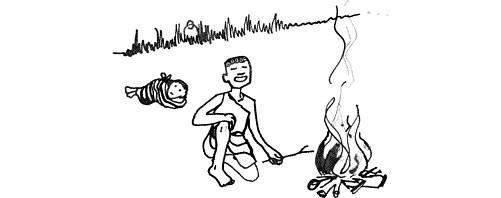
The girl wept with sorrow at the thought of what had happened to her. She wept for her father and mother, whom she would never see again, and she wept for her stupidity in trying to stay in so dangerous a place. Through her tears, she sang a sad song, about how a girl who lived in a cave was captured by a wicked cannibal.
The boy had felt so uneasy on his way home that he had come back to the cave. Now he was hiding in the grass, listening to the sad song of his sister. When he saw the cannibal bending over his fire, the boy rushed forward and pushed him into the flames. The many skins which the cannibal was wearing soon caught fire and he ran wildly away, letting out strange cries as he ran.

The boy untied his sister and then led her back to their father’s new place. That night, the girl told her father of what had happened. He was worried at the thought of the narrow escape that she had had, but he was relieved that she was now safe. He was glad, too, to hear that the cannibal had run away, as this meant that the family could now return to that place where they had been so happy, and where the girl knew they would be happy once again.
